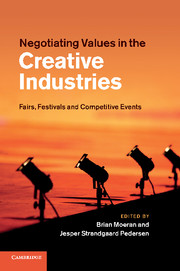Book contents
- Frontmatter
- Contents
- Figures
- Tables
- Contributors
- Acknowledgements
- Introduction
- 1 A Salon’s life
- 2 Art fairs
- 3 Biennalization and its discontents
- 4 Staging auctions
- 5 The book fair as a tournament of values
- 6 Inventing universal television
- 7 Transforming film product identities
- 8 Event institutionalization and maintenance
- 9 Tradition and transformation at the Fan Fair festival
- 10 Between art and commerce
- 11 Configuring sustainability at fashion week
- 12 An inconvenient truce
- 13 The retrospective use of tournament rituals in field configuration
- Afterword Converting values into other values
- Author index
- Subject index
- References
4 - Staging auctions
enabling exchange values to be contested and established
Published online by Cambridge University Press: 25 October 2011
- Frontmatter
- Contents
- Figures
- Tables
- Contributors
- Acknowledgements
- Introduction
- 1 A Salon’s life
- 2 Art fairs
- 3 Biennalization and its discontents
- 4 Staging auctions
- 5 The book fair as a tournament of values
- 6 Inventing universal television
- 7 Transforming film product identities
- 8 Event institutionalization and maintenance
- 9 Tradition and transformation at the Fan Fair festival
- 10 Between art and commerce
- 11 Configuring sustainability at fashion week
- 12 An inconvenient truce
- 13 The retrospective use of tournament rituals in field configuration
- Afterword Converting values into other values
- Author index
- Subject index
- References
Summary
Auctions serve a range of different functions, the two most obvious being the pricing and allocation of goods and services. Auctions fulfil these functions in ‘tournaments of value’, in which both prices and ownership are publicly and openly contested. These contests are generally rich in intense emotionality, expressive gestures, plots and counterplots, dreams, despair, dialogues, repartee, interactions, disclosures, build ups and climaxes. As such, auctions need to be staged to manage physically and normatively the exuberances and contingencies inherent in these pricing and allocation contests. This is done physically by setting and maintaining spatial and temporal boundaries and constraints of the kind discussed in a number of other chapters in this book; it is done normatively by establishing and following various behavioural/ritualistic practices. While these rules, structures, places and times vary from auction to auction depending on a multiplicity of factors, auctions are nearly always a good show.
For social theorists who see social behaviour in general as embodying and revealing dramaturgical features this is not surprising; for them the dramaturgical paradigm is commonly capable of identifying, organizing and explaining facets of behaviour that other paradigms, such as the rational economic man paradigm of neo-classical economic theory, either cannot accommodate or simply ignores. In its most general form, it emphasizes the mutuality of social life and public performances expressed in Shakespeare’s line, ‘All the world’s a stage, and all the men and women merely players’. It conceives of human behaviour as contextual, reflecting and constrained by social expectations, governed more by expressive aims than instrumental tasks, more emotional than rational, and more interactive than self-directed. Perhaps most important, it views social behaviour as requiring the interpretive skills of knowledgeable performers; social life requires not only that social actors comprehend the meaning of the various situations in which they find themselves, but that they are able to renegotiate such meanings with others. Successful performances entail the joint interpretation and modification by performers of scripts and stage directions.
- Type
- Chapter
- Information
- Negotiating Values in the Creative IndustriesFairs, Festivals and Competitive Events, pp. 94 - 118Publisher: Cambridge University PressPrint publication year: 2011
References
- 2
- Cited by



